-meit
On this page, you find all documents, package deals, and flashcards offered by seller -meit.
- 18
- 1
- 1
Community
- Followers
- Following
19 items
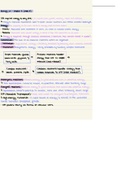
BIOL&211 - (Chapter 8) Metabolism [Page 1]
Cellular energetics -Discuss the major types of energy -Define metabolism, catabolism and anabolism -Distinguish between exergonic and endergonic reactions -Describe the structure and importance of ATP for the cell Enzymes -Describe the role of enzymes in cellular biochemical reactions -Discuss the mechanism of enzyme action and the importance of an active site -Describe different types of enzyme inhibition -Explain allosteric regulation of enzymes -Connect the concept of negative feed...
- Package deal
- Class notes
- • 1 pages •
Cellular energetics -Discuss the major types of energy -Define metabolism, catabolism and anabolism -Distinguish between exergonic and endergonic reactions -Describe the structure and importance of ATP for the cell Enzymes -Describe the role of enzymes in cellular biochemical reactions -Discuss the mechanism of enzyme action and the importance of an active site -Describe different types of enzyme inhibition -Explain allosteric regulation of enzymes -Connect the concept of negative feed...

BIOL&211 Lecture Notes Chapter 3-17
Cellular biology is the study of the structure, function, and organization of cells, which are the basic building blocks of all living organisms. Students will learn about the fundamental principles of cellular biology, including cell structure, organelles, membrane transport, cell signaling, and cellular metabolism.
- Package deal
- • 18 items •
- BIOL&211 - (Chapter 12) Cell Cycle [Page 2] • Class notes
- (Chapter 3) Themes of Biology, Water and Life [Page 1] • Class notes
- (Chapter 8) Metabolism [Page 2] • Class notes
- (Ch4&5) Structure and Function of Large Biological Molecules [Page 3] • Class notes
- BIOL&211 - (Chapter 8) Metabolism [Page 1] • Class notes
- And more ….
Cellular biology is the study of the structure, function, and organization of cells, which are the basic building blocks of all living organisms. Students will learn about the fundamental principles of cellular biology, including cell structure, organelles, membrane transport, cell signaling, and cellular metabolism.

BIOL&211 - (Chapter 17) From Gene to Protein [Page 1]
Genetic code -Differentiate among the three kinds of RNA in terms of structure and function -Define the kind of code present in the nucleotide sequence of DNA Building proteins -Describe the process, machinery (proteins and enzymes) and products of transcription and translation -Demonstrate how specific amino acids are added to the proper tRNAs -Describe the steps involved in protein synthesis Mutations -Analyze the effect of DNA mutations on the amino acid sequence of proteins
- Package deal
- Class notes
- • 1 pages •
Genetic code -Differentiate among the three kinds of RNA in terms of structure and function -Define the kind of code present in the nucleotide sequence of DNA Building proteins -Describe the process, machinery (proteins and enzymes) and products of transcription and translation -Demonstrate how specific amino acids are added to the proper tRNAs -Describe the steps involved in protein synthesis Mutations -Analyze the effect of DNA mutations on the amino acid sequence of proteins
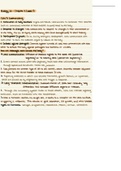
BIOL&211 - (Chapter 11) Cell Communication [Page 1]
Cell Signaling -Discuss the differences between local signaling and long-distance cellular communication -Describe the three stages of cell signaling. Receptor Proteins -Know what receptor proteins are, where they are located, and what they do -Know the three cell surface receptor superfamilies, the basic structures of each and how each functions to convert an extracellular signal to an internal one. -Differentiate between intracellular receptors and cell surface receptors in terms of func...
- Package deal
- Class notes
- • 1 pages •
Cell Signaling -Discuss the differences between local signaling and long-distance cellular communication -Describe the three stages of cell signaling. Receptor Proteins -Know what receptor proteins are, where they are located, and what they do -Know the three cell surface receptor superfamilies, the basic structures of each and how each functions to convert an extracellular signal to an internal one. -Differentiate between intracellular receptors and cell surface receptors in terms of func...
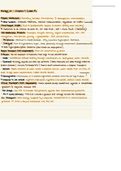
BIOL&211 - (Chapter 7) Membranes [Page 1]
Plasma membrane -Use the fluid mosaic model to describe the structure of the cell membrane -Describe some of the proteins associated with the cell membrane Diffusion -Define the term "Selectively permeable" -Differentiate passive from active transport -Differentiate simple from facilitated diffusion Transport -Describe the steps of active transport -Use ions to power secondary active transport
- Package deal
- Class notes
- • 1 pages •
Plasma membrane -Use the fluid mosaic model to describe the structure of the cell membrane -Describe some of the proteins associated with the cell membrane Diffusion -Define the term "Selectively permeable" -Differentiate passive from active transport -Differentiate simple from facilitated diffusion Transport -Describe the steps of active transport -Use ions to power secondary active transport
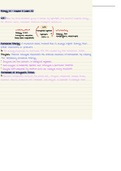
(Chapter 8) Metabolism [Page 2]
Cellular energetics -Discuss the major types of energy -Define metabolism, catabolism and anabolism -Distinguish between exergonic and endergonic reactions -Describe the structure and importance of ATP for the cell Enzymes -Describe the role of enzymes in cellular biochemical reactions -Discuss the mechanism of enzyme action and the importance of an active site -Describe different types of enzyme inhibition -Explain allosteric regulation of enzymes -Connect the concept of negative fe...
- Book & Paket-Deal
- Class notes
- • 1 pages •
Cellular energetics -Discuss the major types of energy -Define metabolism, catabolism and anabolism -Distinguish between exergonic and endergonic reactions -Describe the structure and importance of ATP for the cell Enzymes -Describe the role of enzymes in cellular biochemical reactions -Discuss the mechanism of enzyme action and the importance of an active site -Describe different types of enzyme inhibition -Explain allosteric regulation of enzymes -Connect the concept of negative fe...
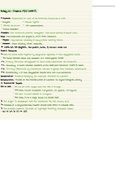
(Ch4&5) Structure and Function of Large Biological Molecules [Page 3]
O-Chem basics -Describe C atom, its bonds and importance of hydrocarbons -Distinguish between seven major functional groups -Know the basic structure of ATP and ADP 4 major macromolecules -Explain basic structure and functions of simple and complex sugars -Discuss different types of lipids and their role in biology -Describe protein chemical structure -Differentiate and discuss many different functions of proteins -Briefly explain the basic structure of nucleic...
- Book & Paket-Deal
- Class notes
- • 1 pages •
O-Chem basics -Describe C atom, its bonds and importance of hydrocarbons -Distinguish between seven major functional groups -Know the basic structure of ATP and ADP 4 major macromolecules -Explain basic structure and functions of simple and complex sugars -Discuss different types of lipids and their role in biology -Describe protein chemical structure -Differentiate and discuss many different functions of proteins -Briefly explain the basic structure of nucleic...

(Chapter 3) Themes of Biology, Water and Life [Page 1]
Water -Describe the physical and chemical properties of a water -Explain how hydrogen bonds result in cohesive and adhesive properties of water -Explain how water resists temperature changes -Describe evaporative cooling -Explain why water is called universal solvent
- Book & Paket-Deal
- Class notes
- • 1 pages •
Water -Describe the physical and chemical properties of a water -Explain how hydrogen bonds result in cohesive and adhesive properties of water -Explain how water resists temperature changes -Describe evaporative cooling -Explain why water is called universal solvent

BIOL&211 - (Chapter 12) Cell Cycle [Page 2]
Cell cycle basics -Define cell division and cell cycle -Differentiate between somatic cells and gametes -Describe the structure of an eukaryotic chromosome Mitosis -List and discuss changes during every stage of cell cycle with emphasis on mitosis -Explain the role of kinetochore and mitotic spindle in mitosis -Compare cytokinesis in animal and plant cells Controlling the cell cycle -Discuss the importance of cell cycle control system -Describe the fluctuation of cyclin and MPF dur...
- Book & Paket-Deal
- Class notes
- • 1 pages •
Cell cycle basics -Define cell division and cell cycle -Differentiate between somatic cells and gametes -Describe the structure of an eukaryotic chromosome Mitosis -List and discuss changes during every stage of cell cycle with emphasis on mitosis -Explain the role of kinetochore and mitotic spindle in mitosis -Compare cytokinesis in animal and plant cells Controlling the cell cycle -Discuss the importance of cell cycle control system -Describe the fluctuation of cyclin and MPF dur...
